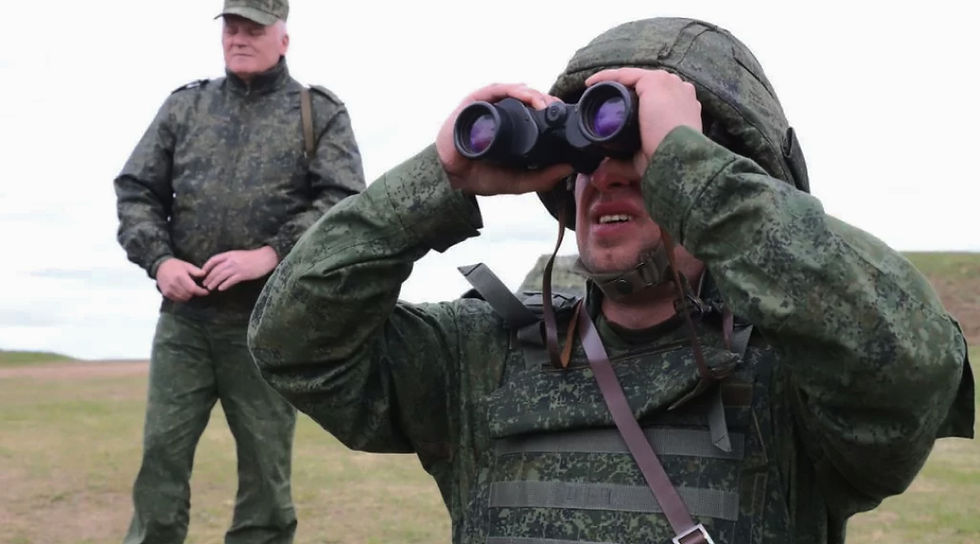Lukashenko — the Internal Occupier
- Admin of the NAM

- Nov 10, 2025
- 4 min read

On November 6 in Mozyr, during the ceremony opening the renovated bridge over the Pripyat River, Lukashenko said a phrase that could have seemed harmless, if not for its full context:
"I have always asked one thing from you — give me the economy. Give me bridges, roads, milk, meat, and so on. And military matters — those are my responsibilities, security — my responsibility, I will handle them".
It sounds almost like an order. "Give me" is not a request but a demand, addressed not to subordinate ministries, but to the entire nation. The people — the suppliers; the ruler — the consumer. In this rhetoric, one can hear an old occupational motif: the authorities demand, and the population must comply.
Hearing such a demand from a dictator, "Give me", immediately recalls stories and films from World War II, when German soldiers entering Belarusian villages said almost the same — only without political disguise. "Eggs, milk, meat, bread" — they demanded from the peasants. There was no request, only an order. Back then, under the occupiers, this was called requisition; now, under Lukashenko — it is called "supporting the economy".
Yes, the Belarusian economy under the "economist" Lukashenko, to put it mildly, is not gaining momentum, and is rather slowing down. The industrial sector, once the pride of Belarus and the engine of GDP, has today become the main brake on the economy: industrial output in current prices for the first nine months of this year fell by 0.8% compared to the same period last year. Agricultural production fell by 1% compared to the same period last year.
The trade deficit in goods for January–September reached $4.5 billion. The month before, imports exceeded exports by $3.8 billion. Belarus is buying more and selling less.
And Lukashenko is desperately short of money to maintain his seized power. That is why his rhetoric becomes increasingly arrogant and demanding — "Give me".
And what, in return, does the dictator offer the people of Belarus for "bridges, roads, milk, and meat" ? Does he offer increased social benefits, lower taxes, or reduced utility bills? No — quite the opposite. Social guarantees are shrinking, while taxes and utility payments are rising. Lukashenko has reached such a level of cynicism toward the population that in the draft law on the 2026 state budget, he included fines collection 27% higher than this year. He plans to fine Belarusians for a total of 310.3 million rubles.
Think about it! The dictator has already planned that next year every resident, from newborns to pensioners and people with disabilities — according to his statistics, Belarus has 9.1 million residents — will inevitably violate some rule and pay a fine averaging 34 rubles. Effectively, Lukashenko is budgeting planned punishment for citizens.
At the same time, spending on security forces — Ministry of Internal Affairs, KGB, courts — is growing. In other words, the state spends less on people and more on controlling them.
Today’s regime in Belarus operates on the same principle as the occupiers during the war. Only Belarus was never attacked, and no one plans to, yet Lukashenko persistently transmits and instills fear. Security rhetoric becomes central. It turns every complaint into a threat, every citizen into a suspect. Under the slogan "I am responsible for security", Lukashenko justifies growing spending on the security apparatus and pressure on society.
Belarus has been turned into an internal occupation zone. The regime lives off the population, and the population is obliged to "give" — work, endure, remain silent. Everything else is a "security matter" into which one should not interfere. Just like during the occupation years, fear replaces law, and obedience replaces freedom and dignity.
Dictatorship is always built on the dependence of the population. It creates nothing — it consumes. Its "economy" is based not on creation, but on coercion. It demands loyalty instead of initiative, obedience instead of trust. "Give me the economy", says Lukashenko, and this is not an economic slogan, but an admission of the essence of the regime: the people exist to feed his power.
Remember, in October 2020, a general strike was planned. At the checkpoint of the Grodno Azot plant, riot police and OMON were stationed. People were forced to work, with shouts behind them: "Go to work, you are our food base".
This phrase, like the dictator’s statement about "give me the economy", is not a slip of the tongue but a program. It communicates the idea that only Lukashenko can make decisions, and everyone else must provide. This creates psychological dependence in society, when people get used to thinking that initiative is dangerous, and independence is punishable.
When Lukashenko demonstratively places himself above the people, dividing them: "You build, I command", — he turns the country into his personal garrison. And just as occupiers once took the peasants’ last possessions under the pretext of war, today the dictatorship sucks out the country’s strength, money, and future, justifying it as “security.”
The only difference is that occupiers left, while dictators do not. They remain until the people stop "giving" and demand their right to life, work, and their country back.
We often think that liberation begins with elections or democratic slogans. But it begins with refusing to give by command. With the realization that "the economy" is not power, but people, their energy, labor, and initiative. As long as the population is perceived as a food base for the regime, no reforms are possible.
Internal occupation ends when society stops being an object and becomes a subject — when Belarusians say: "Enough of giving. It’s time to claim what is ours".










Comments